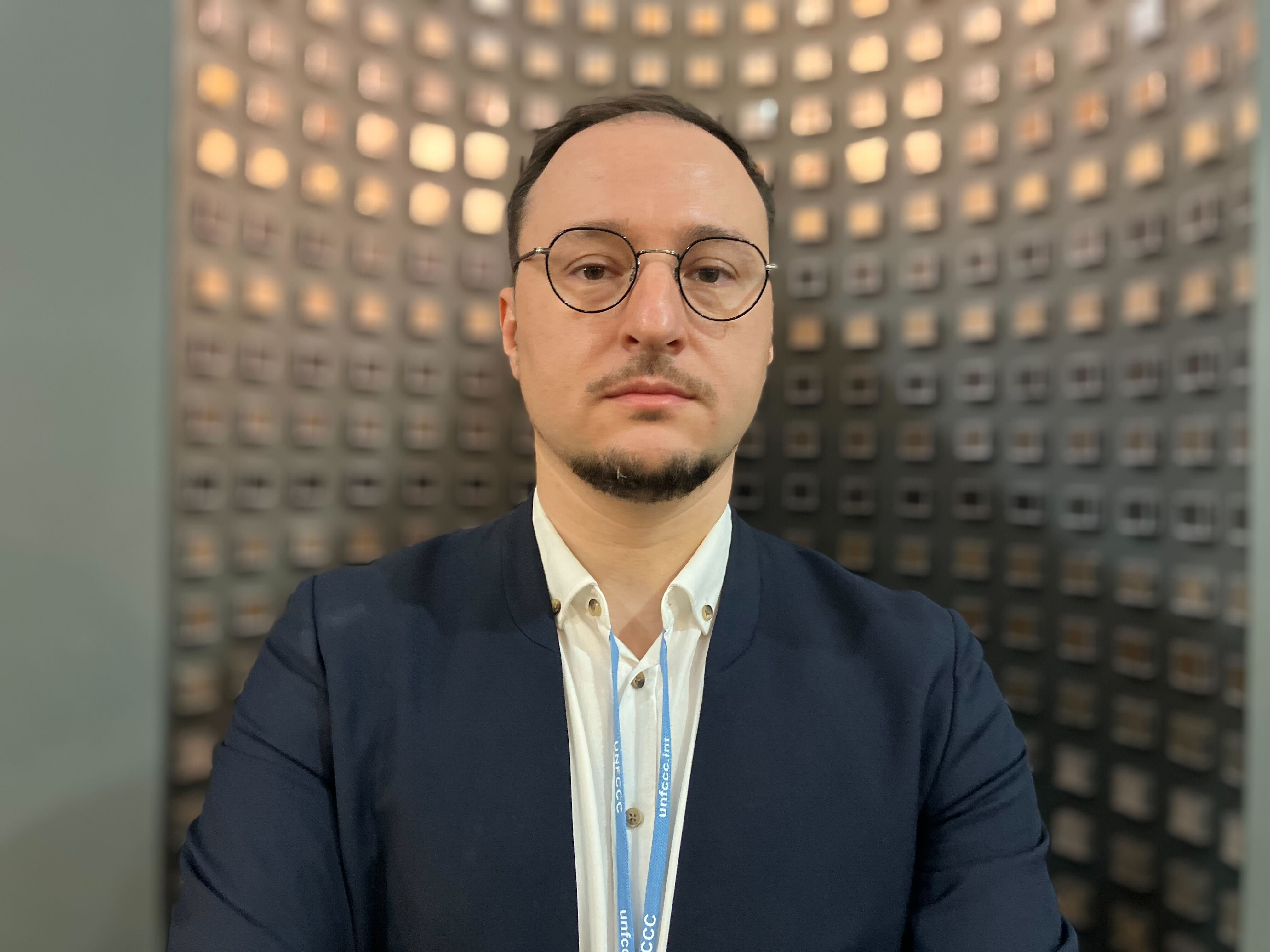Kherson liberation an important step to victory and building greener Ukraine, official says
Exclusive: Destruction of Ukraine’s industrial heartland is opportunity for country to move to ‘clean and green’ future

Liberating the strategic city of Kherson would be an important step on the path to Ukrainian victory and transforming the country into a green economy, a member of Ukraine’s official delegation to Cop27 has said.
Russia’s military said on Wednesday that it would retreat from the only Ukrainian regional capital it had captured in more than eight months of war. But there is concern in Kyiv that it could be a ruse by Moscow to attack Ukrainian troops, said Oleksii Riabchyn, who advises the government on its green transition.
Losing Kherson would deal a significant blow to Moscow, but even if it’s not the breakthrough Ukrainians hope it is, Mr Riabchyn is convinced the war is headed in the right direction.
“We believe we will win,” he told The Independent at the crucial climate summit in Egypt on Thursday. With dreams of victory, come dreams of reconstruction and Ukraine’s pavilion at the climate summit makes clear that the country wants to become a green energy hub in Europe.
“We’re not just talking about ‘rebuilding,’ but about creating something new,” read an exhibit funded by the United Nations, the European Union and Germany among others.
It was message reiterated by Mr Riabchyn, who said Russia’s destruction of Ukraine’s industrial heartland and its energy infrastructure means the country can “leapfrog” forward to make the country more “clean and green”.
“We can redesign the country from scratch,” he said.
This means rebuilding homes that are energy efficient, replacing old fossil fuel energy sources with renewable ones and replacing the old metal smelters of the industrial city of Mariupol that are powered by coke furnaces with metal production fuelled by hydrogen, he said.
“This is what we dream about,” he said.
This summer Ukraine launched an initiative to install 30GW worth of renewable energy sources by 2030, in a bid to become the main exporter of clean energy in Europe and end reliance on Russian fossil fuels. But first, Kyiv says it needs to expel Russia from its land and guarantee long-term peace.
“No one will invest in Ukraine if there won’t be security guarantees,” said Mr Riabchyn, adding that it would take billions of dollars to transform Ukraine into a green powerhouse.
For now, that vision seems a long way off as the war continues to pollute and damage Ukraine’s natural environment. A virtual reality headset at the pavilion at Cop27 allows viewers to experience the aftermath of conflict from Kyiv to the Zaporizhzhia region – to stand amongst the rubble of a collapsed apartment block or on the banks of a river looking down at a collapsed bridge in the water below.

Mr Riabchyn asked British readers to imagine how they might feel to see the crystal clear Scottish waters now polluted, or the Lake District cut up.
“It’s very painful,” he said.
Ukraine has been monitoring the environmental destruction of the country and will pursue Russia to pay environmental reparations for the damage wrought, said Mr Riabychn. Ukraine is pushing for a global platform to assess the impact of war on the climate and the environment to allow countries to claim damages in international courts, he said.
“It will put an additional burden on aggressors,” he said, adding that Ukraine hoped it may help stop future wars.
At Cop27, Ukraine hoped for recognition that Russia is a “climate terroristic” country that is weaponising energy and using the UN to cement its claims over Crimea by claiming its carbon emissions as Russian, he said.
Ukrainian president Volodymyr Zelensky, in a virtual address to Cop27 on Tuesday, accused Russia of hampering and distracting from global efforts to combat climate breakdown.
The country’s other goal at the conference is to secure access to green finance to rebuild more sustainably, said Mr Riabchyn.
UN negotiations can often be tense but for the Ukrainian delegation, it will be additionally stressful. As Mr Riabchyn navigates the intricacies of Cop talks he said he was sporadically reminded of what’s happening back home.

“Suddenly your phone signals that there is an air alarm in Kyiv, and you think about your wife and kids, whether they are safe, whether they heard this air alarm and they were able to get to the bomb shelter,” he said. “It’s like a reality check.”
But broadly, Mr Riabchynsaid he was hopeful not just for the future of Ukraine but the green transition that the world is embarking on more generally.
After Russia first invaded in February, Mr Riabchyn said he had been concerned that Europe would abandon its “green deal” – a commitment to be the first climate-neutral continent – as governments were forced to respond to rising energy prices.
But instead, he said, it meant that Greta Thunberg’s argument that the world needs to get off fossil fuels to protect the planet for future generations was quickly complemented by another one: energy security.
“There is no other way of development but green for everybody,” he said.







Join our commenting forum
Join thought-provoking conversations, follow other Independent readers and see their replies
Comments